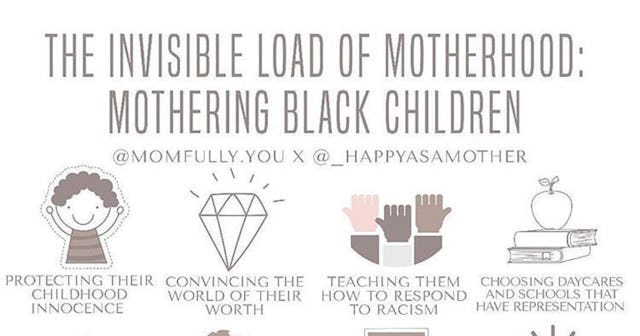Mothering Black Children Comes With Invisible Weight, And This Graphic Perfectly Sums It Up

Our social media feeds are jam-packed with information about race, racism, anti-racism, racial justice, protesting, and policing right now. It’s overwhelming at times to sort through the articles, memes, and videos. However, one recent graphic stopped me in my tracks, and for good reason. Two moms worked together to create a graphic that would teach us about the invisible load of Black motherhood and to remind us that moms need to stick together.
Chasity Holcomb is a Black woman, Licensed Professional Counselor in Texas, and mom of two girls. Erica Djossa is a white woman in an interracial marriage. She’s raising three bi-racial boys, and she is a registered psychotherapist and maternal mental health specialist. Erica was running a graphic series on social media, focusing on the invisible load mothers face. She invited Chasity to co-create a graphic specifically for mothers of Black children.
Chasity told Scary Mommy that the graphic is important because it “gives a visual representation of what it’s like to raise a Black child. All of the worries, the extra steps of protecting their physical, emotional, and social well-being, and the duty to raise them to love their skin despite the ever-present racism in the world.” She added, “It is a heavy load. [. . .] this graphic gave a voice and validation that we see the invisible load and an invitation for other mothers to see it too.”
Erica invited Chasity to be part of the invisible motherhood series after having her own experiences craving an anti-racism world for her own biracial sons. As a professional, she bore witness to many challenges that Black, indigenous, and women of color face when giving birth and in motherhood. She told Scary Mommy, “The unique challenges that BIPOC face in their birthing experiences have been widely documented, but something that many of us white women are completely unaware of.” She wanted to highlight some of the specific challenges that these mothers face, raising awareness.
Chasity reminds us that those who parent Black children “have no choice but to teach our children about racism. It’s not a matter of if, but a matter of when.” Talking to Black children is “hard and difficult, but non-negotiable.” She said that though her children are too young to understand “the talk,” she dreads the day that conversation begins. She told Scary Mommy, “I have to explain to them why some people won’t like them just because they have more melanin in their skin or how to respond to racist comments or how to value their worth in a world that does not.”
Erica shared, “I had no idea when becoming a (white) mother to black children that I would be discussing topics like racism and bias at such a young age. As a white woman raised in a white household I NEVER had conversations about my race or being treated a different because of the color of my skin.” She added, “Mothering black children doesn’t afford you the privilege to keep your head in the sand and act like racism is a thing of the past.”
The graphics that Erica co-creates and shares have deeply resonated with me. I’m a mom of four children, all of whom are Black. Like Erica, I’m a white woman raised in a white household. I have never been followed by a police or security officer, and my intentions or purpose (such as in a store) have never been questioned. I have had white privilege my entire life, but my children do not. As my kids have gotten older, we’ve had more and more talks about racism and the rules in which we have in place to keep our children safe. We do this with the help of racial role models, since we, as the parents, don’t have the experiences to share with our children.
Erica’s work not only raises awareness, but she’s pulling up more chairs to the table and handing the mic over to moms of color, including Chasity. The series is not only educating — it’s building camaraderie among moms who have never met one another but can take their education and share it within their own mom communities.
Erica also recently partnered with Dr. Angel Montfort, a psychologist and mother of four, to create a self-care list for Black mothers. Some of their suggestions include limiting news and social media, learning from other Black mothers and building community with them, and giving themselves permission to accept what they are feeling.
Erica asks fellow white moms to be empathizers when a mom of color shares her experience. First, white moms need to realize that they have unconscious biases and we need to “disarm our defenses or our need to compare experiences” with another mom. We also have to stop minimizing or invalidating that mom’s experience. The best things we can do are listen and learn.
“I think moms are at their best when they sincerely support one another despite the difference of life experience,” Chasity said. “When moms extend compassion and support with judgement or fear of vulnerability, the product is healing.” She encourages us to listen and validate the other’s experience “without defense or rebuttal.”
Ultimately, she believes that when moms come together, they can change the world. We couldn’t agree more.
This article was originally published on